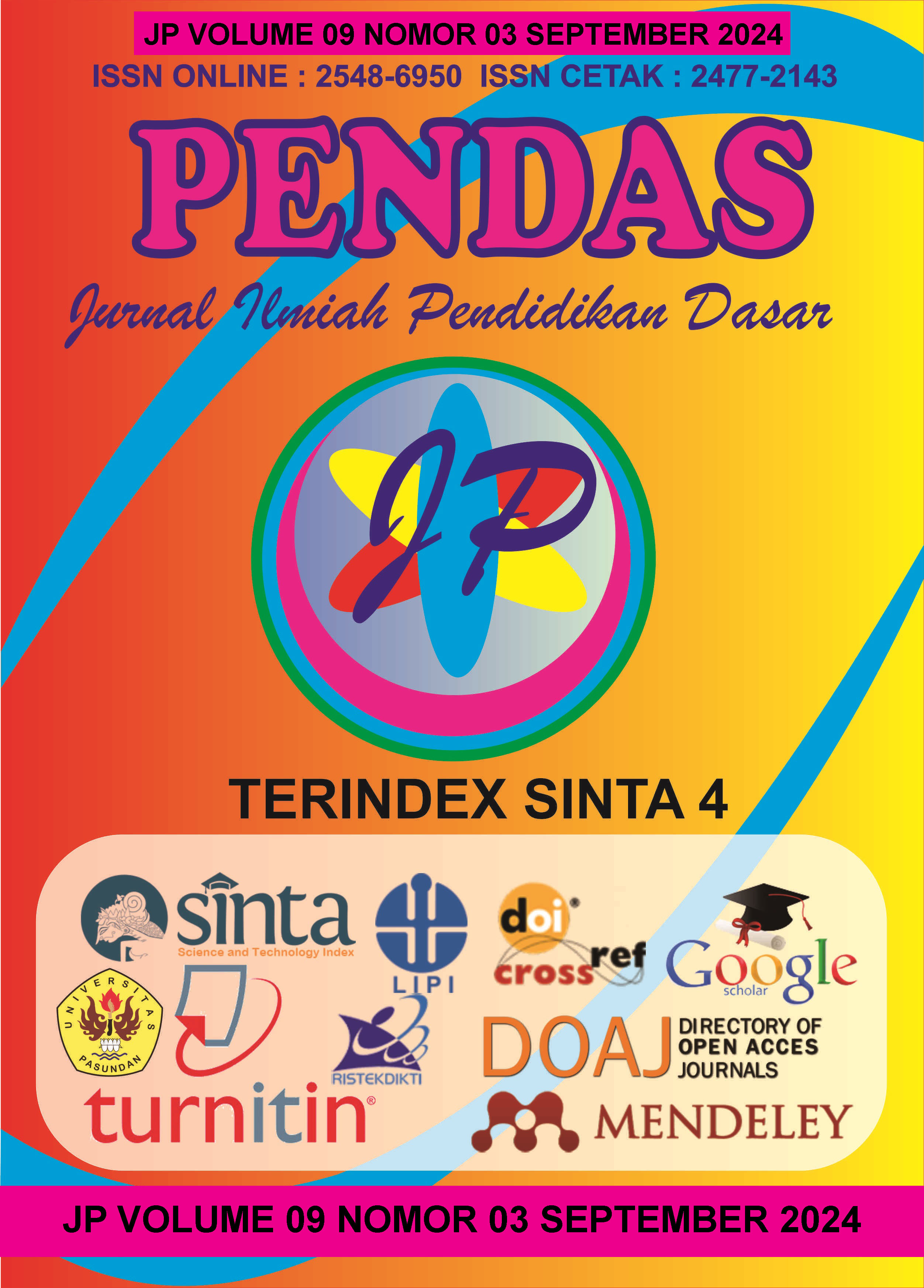PENERAPAN METODE ROLE PLAYING UNTUK MENINGKATKAN HASIL BELAJAR SISWA KELAS IV SDN 01 KLEGEN PADA MATA PELAJARAN IPAS TOPIK PEMENUHAN KEBUTUHAN
DOI:
https://doi.org/10.23969/jp.v9i3.15443Keywords:
Learning Outcomes, Science Education (IPAS), Role Playing MethodAbstract
The research aims to improve the learning outcomes of fourth-grade students at SDN 01 Klegen, Madiun City, through the application of the Role Playing method. This study was conducted in the even semester of the 2023/2024 academic year with 29 students as research subjects. The type of research used is collaborative Classroom Action Research (CAR). Data collection was done using observation, interviews, documentation, and tests. Through the application of the Role Playing method, students were able to focus on demonstrating the fulfillment of needs before money was discovered. The initial condition of completeness percentage was 31.03%, then increased to 62.07% with 18 students in cycle I. In cycle I, learning outcomes increased but were not optimal, so the implementation phase of cycle II was carried out and achieved 100% completeness. With the application of the Role Playing method, teachers invite students to role-play by bringing real-world situations into the classroom, allowing students to directly experience situations and conditions in their surrounding environment to solve problems of fulfilling needs. Thus, the Role Playing method can improve student learning outcomes.Downloads
References
Anggelia, D., Puspitasari, I., & Arifin, S. (2022). Penerapan Model Project-based Learning ditinjau dari Kurikulum Merdeka dalam Mengembangkan Kreativitas Belajar Pendidikan Agama Islam. 7 No.2. https://doi.org/https://doi.org/10.25299/al-thariqah.2022.vol7%282%29.11377
Arikunto, S., Suhardjono, & Supardi. (2015). Penelitian Tindakan Kelas. PT Bumi Aksara.
Asih Widi Wisudawati, E. S. (2022). Metodologi Pembelajaran IPA. Bumi Aksara.
Daryanto. (2018). Penelitian tindakan kelas dan penelitian tindakan sekolah beserta contoh-contohnya (Edisi pert). Gava Media.
Fitriyah, C. Z., & Wardani, R. P. (2022). Paradigma Kurikulum Merdeka Bagi Guru Sekolah Dasar. Scholaria: Jurnal Pendidikan Dan Kebudayaan, 12(3), 236–243. https://doi.org/10.24246/j.js.2022.v12.i3.p236-243
Jannah, F., Fathuddin, T. I., & Zahra, P. F. A. (2022). Problematika Penerapan Kurikulum Merdeka Belajar. Social Science Academic, 4, 55–65.
Junaidah. (2022). Penerapan Metode Role Playing Dalam Proses Pembelajaran. Jurnal Aktualisasi Pendidikan Islam, 19. No.2, 94–104. https://doi.org/10.58645/jurnalazkia.v17i1.172
Jusuf, H., & Sobari, A. (2022). Pembelajaran Paradigma Baru Kurikulum Merdeka Pada Sekolah Dasar. Jurnal Pengabdian Kepada Masyarakat UBJ, 5(2), 185–194. https://doi.org/10.31599/jabdimas.v5i2.1360
Kemdikbud. (2022). Buku Saku Kurikulum Merdeka; Tanya Jawab. Kementerian Pendidikan Dan Kebudayaan, 1–50.
Marwa, N. W. S., Usman, H., & Qodriani, B. (2023). Persepsi Guru Sekolah Dasar Terhadap Mata Pelajaran IPAS pada Kurikulum Merdeka. METODIK DIDAKTIK:Jurnal Pendidikan Ke-SD-An, 18(2), 54–65. https://ejournal.upi.edu/index.php/MetodikDidaktik/article/view/53304
Oemar Hamalik. (2014). Kurikulum dan pembelajaran (1st, cet.ke- ed.). Bumi Aksara.
Qolbu, N. S., Sutisnawati, A., & Amalia, A. R. (2022). Pengembangan Media Animus dalam Pembelajaran IPAS di Sekolah Dasar. Jurnal Basicedu, 6, 10341–10350. https://jbasic.org/index.php/basicedu/article/view/4999
Soyomukti, N. (2017). Teori-teori Pendidikan: Tradisional, (Neo)liberal, Marxis-sosialis, Postmodern (M. Sandra (ed.)). Ar-Ruzz Media.
Sukmadinata, N. S., & Mukhlis. (2006). Pengembangan Kurikulum Teori dan Praktek. Remaja Rosdakarya.
Uno, H. B. (2007). Model Pembelajaran (Fatna Yustianti (ed.)). Bumi Aksara.
Downloads
Published
Issue
Section
License
Copyright (c) 2024 Pendas : Jurnal Ilmiah Pendidikan Dasar

This work is licensed under a Creative Commons Attribution 4.0 International License.



















